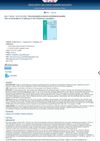Protective Effects of Selenium in Patients with Beta-Thalassemia Major
March 2020
in “
̒Ulūm-i dārūyī
”
TLDR Selenium supplements improved liver and kidney function and reduced hair loss in beta-thalassemia major patients.
In a clinical trial involving 34 beta-thalassemia major patients, selenium supplementation (200 µg/day for one month) significantly improved liver and kidney function markers, including ALT, AST, and serum creatinine levels. Additionally, selenium supplementation notably enhanced hair profile and reduced severe hair loss. The study concluded that selenium has protective effects on liver and kidney functions and improves hair health in beta-thalassemia major patients, though further research is needed.







